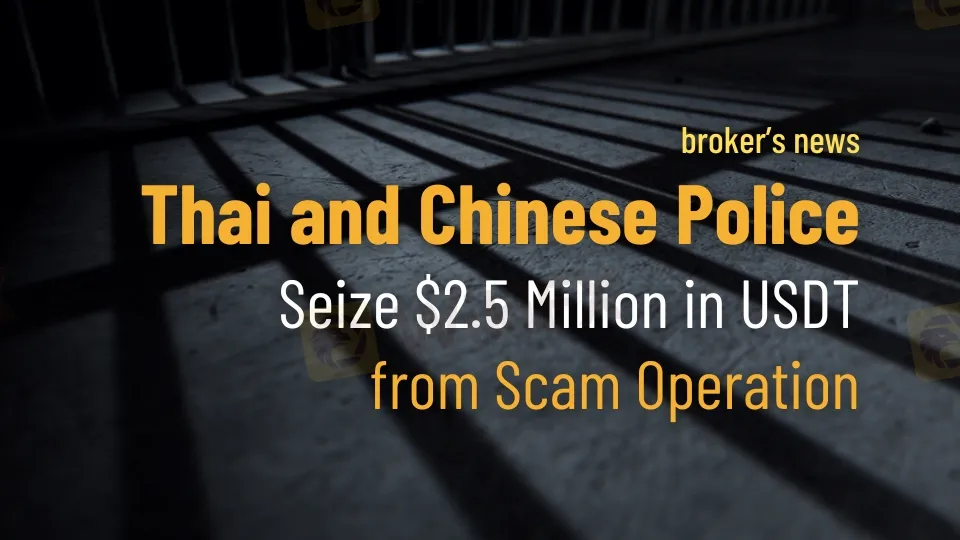简体中文
繁體中文
English
Pусский
日本語
ภาษาไทย
Tiếng Việt
Bahasa Indonesia
Español
हिन्दी
Filippiiniläinen
Français
Deutsch
Português
Türkçe
한국어
العربية
Thai and Chinese Police Seize $2.5 Million in USDT from Scam Operation
Abstract:Thai and Chinese authorities collaborate to arrest suspects and seize $2.5 million in USDT from a large-scale scam operation, highlighting the traceability of Tether transactions.

Thai and Chinese law enforcement authorities have detained two Chinese individuals and confiscated $2.5 million in Tether's USDT stablecoin, destroying a large-scale Ponzi enterprise. The arrests, which occurred on February 5, highlight the efficacy of international coordination in tackling cryptocurrency-related crimes.
The defendants, Ye Wanyou, 29, and Li Weijie, 30, were captured at a luxurious apartment in Bangkok. Upon arrest, they attempted to remove data from their phones but were quickly apprehended by officials. Initial investigations resulted in the seizure of assets totaling $44,550. Additional coordination with Chinese authorities resulted in the freezing of $2.5 million USDT kept in concealed digital wallets.
A spokeswoman for Tether remarked on the operation, saying, “With Tether, every action is online, every transaction is traceable, every asset can be seized, and every criminal can be caught.” This statement emphasizes the openness and traceability inherent in blockchain-based transactions, which can help law enforcement follow down unlawful acts.

The inquiry also turned up evidence that the suspects were involved in human trafficking activities along Thailand's border with Myanmar, notably in the Mae Sot region of Tak province. Authorities located prospective offices in Phnom Penh, Cambodia, and detected fraudulent goods sales activities in Thailand.
Police Lieutenant General Siam Boonsom, Commissioner of the Metropolitan Police Bureau, said that the two men had been charged with public fraud. Authorities oppose bail, and the investigation is ongoing, including efforts to find and capture any collaborators.
This investigation is part of a larger trend of international collaboration against cryptocurrency-related crimes. In mid-December 2024, the Nigerian Economic and Financial Crimes Commission detained approximately 800 people nationally in connection with crypto romance scams, with a large number of Chinese nationals implicated.
Furthermore, in February, Hong Kong police intercepted more than $3.37 million (HK$34 million) in scam earnings as part of an extensive investigation that targeted victims using artificial intelligence.
These cases highlight the growing necessity for international cooperation and cutting-edge technology solutions to combat the rising tide of cryptocurrency-related crimes. The traceability of blockchain transactions, as proved in the recent Thai-Chinese operation, is critical to these efforts, allowing authorities to monitor and collect illegal assets more efficiently.

Disclaimer:
The views in this article only represent the author's personal views, and do not constitute investment advice on this platform. This platform does not guarantee the accuracy, completeness and timeliness of the information in the article, and will not be liable for any loss caused by the use of or reliance on the information in the article.
Read more

Scammers Use AI to Fake Lim Guan Eng’s Support for Investment Scheme
A fake video showing former Penang Chief Minister Lim Guan Eng promoting an investment scheme has started spreading online. Lim has come forward to say the video is not real and was made using artificial intelligence (AI).

Tighter Scrutiny: Finfluencers Face Global Crackdown Amid Rising Risks
The UK’s Financial Conduct Authority (FCA), in collaboration with eight global regulators, has taken strong enforcement actions against unauthorised finfluencers. The move signals a broader regulatory shift toward stricter oversight of financial promotions on social media.

Interactive Brokers Enhance Account Security with FDIC Coverage
Interactive Brokers now offers up to $5M FDIC insurance for individual accounts, boosting protection on cash held in brokerage accounts starting May 2025.

Exnova Forex Broker Scam: Blocked Accounts, Lost Funds
Exnova forex broker slammed for scam tactics, blocking withdrawals, and dodging regulation. Victims warn of fraud risks—steer clear!
WikiFX Broker
Latest News
IronFX Broker Review 2025: A Comprehensive Analysis of Trustworthiness and Performance
OctaFX Flagged by Malaysian Authorities
OctaFX and XM Trading Platforms to Be Blocked in Singapore
ATFX Opens New Office in Cape Town's Portside Tower to Expand in Africa
Tighter Scrutiny: Finfluencers Face Global Crackdown Amid Rising Risks
IronFX: A Closer Look at Its Licences
2025 Broker Real - World Reviews: Share Your Insights & Grab Thousands in Rewards!
Nonfarm Data Lifts Market Sentiment, U.S. Stocks Rebound Strongly
Interactive Brokers Enhances PortfolioAnalyst with New Features
Eid ul Adha Celebration Continues – Grab the STARTRADER Offer Now!
Currency Calculator


